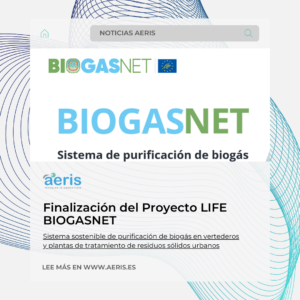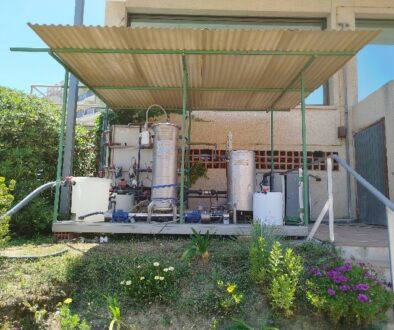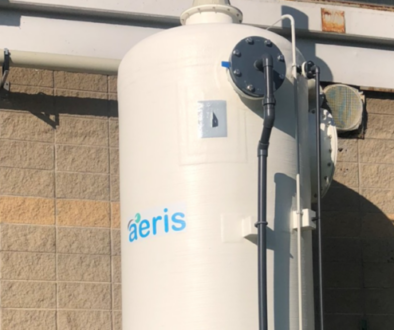The LIFE BIOGASNET project ends successfully

The LIFE BIOGASNET project in which Aeris has actively participated has successfully concluded, validating a biogas purification technology to promote its use as alternative energy.
A new biogas purification technology to boost its utilization as an alternative energy
- The innovation aims to desulphurize the biogas produced in urban solid waste treatment plants and wastewater treatment plants.
- Developed by the LIFE Biogasnet project, the solution is based on the application of efficien and low-cost biological technologies.
Barcelona, may 2024. – The European LIFE Biogasnet project has validated a new biogas purification technology, which allows improving the quality of this resource produced in urban solid waste treatment plants and wastewater treatment plants, as well as reducing the carbon footprint of the cycle energy and promote the circular economy concept.
Specifically, the solution “is based on the application of biological, efficient and low-cost technologies, and allows to increase the quality of biogas to promote its use as an alternative energy source”, explains the project coordinator, Xavier Gamisans, professor at the Polytechnic University of Catalonia in Manresa.
The developed system has been tested for a year in an urban solid waste treatment plant located in Cádiz and, subsequently, in a municipal solid waste treatment plant in the Attica region, in Athens (Greece), two facilities in which that have been used with different sources of effluents rich in ammonium to desulphurize biogas with the aim of validating the technology and its operation in diverse environments and conditions.
At the same time, “exhaustive studies on the environmental impact of the technology have been carried out to objectively demonstrate which are the most favourable scenarios for its implementation”, explains the director of the Waste, Energy and Environmental Impact Unit from the Eurecat technology centre, Frederic Clarens. In this sense, “scaling studies have been carried out for installations other than those where the project system has been installed and operated, for example, in wastewater treatment plants”.
According to the director of Eurecat’s Water, Air and Soil Unit, Xavier Martínez, this project “is a clear example of how biological technologies for gas treatment are becoming more robust and attractive for its implementation in industry”.
Validation in two real waste treatment facilities
For its validation, the technology installed in Cádiz has included an anoxic bioreactor for the elimination of hydrogen sulphide from biogas with yields greater than 97%. The elimination of hydrogen sulphide is carried out using nitrate and/or nitrite, which is obtained in a nitrification bioreactor using the landfill leachate itself as a source of ammonium. Hydrogen sulphide is mainly oxidized to elemental sulphur, a re-valuable byproduct.
Regarding the installation in the Athens plant, the process has initially consisted of capturing the ammonia present in the extraction gases of a composting plant in a liquid stream by a bioscrubber. This stream has been nitrified to nitrite and/or nitrate to be used in an anoxic trickling biofilter to eliminate hydrogen sulphide through its majority oxidation to sulphate. Finally, this sulphate has been combined with some of the ammonium-rich liquid to produce ammonium sulphate in a CSTR reactor, effectively converting waste gases into a useful product.
The LIFE Biogasnet consortium has included the Polytechnic University of Catalonia, project coordinator, the Eurecat technology centre, the University of Cadiz and the National Technical University of Athens, and the companies AERIS Tecnologies Ambientals and Bioreciclaje de Cádiz.
About the Polytechnic University of Catalonia
The Polytechnic University of Catalonia – Barcelona Tech (UPC) is a public research and higher education institution in the fields of engineering, architecture, science and technology and one of the main technical universities in Europe. Within the UPC, at its Manresa Campus, the BIOGAP (Biological Treatment of Gaseous and Odorous Pollutants) research group has more than 20 years of experience in biological gas treatments and has in recent years become a benchmark for it involves the application of biological techniques to solve a wide range of environmental problems. The group has extensive experience in the use of biofilters for the treatment of different types of organic and inorganic gaseous pollutants as well as in the characterization of these devices both from a theoretical point of view (advanced modelling using CFD techniques) and from a practical point of view (design and construction of pilot plants, respirometric techniques, biofilm monitoring using ad hoc designed microsensors, among others). This has allowed them to develop a new desulfurization technology. The group has extensive experience in the management of public and private projects and, in general, in the transfer of knowledge. More information at https://futur.upc.edu/BIOGAP
The UPC has been responsible for the coordination of the Biogasnet project, the evaluation of the economic impact of the technology, the dissemination of results and networking, as well as the collection of data and its processing and the modelling of the processes.
About Eurecat
Eurecat, Technology Centre of Catalonia, gathers the experience of more than 750 professionals who generate a volume of income that exceeds 60 million euros annually and provides service to 2,000 companies. Applied R&D, technological services, highly specialized training, technological consultancy and professional events are some of the services that Eurecat offers to both large and small and medium-sized companies in all sectors. With facilities in Barcelona, Canet de Mar, Cerdanyola del Vallès, Girona, Lleida, Manresa, Mataró, Reus, Tarragona, Amposta, Vila-seca and Chile, it participates in more than 200 major R&D consortium projects national and international of high strategic value and has 200 patents and 10 spin-offs. The added value that Eurecat provides accelerates innovation, reduces spending on scientific and technological infrastructures, reduces risks and provides specialized knowledge tailored to each company. More information at www.eurecat.org
Within the LIFE Biogasnet project, Eurecat has supported the coordination of the project, the assessment of the environmental and socio-economic impact, as well as being responsible for communication, dissemination of results and networking.
About the University of Cadiz
The University of Cádiz, founded in 1979, has a Biological and Enzymatic Reactors Research Group, focused on the field of biotreatment of gaseous emissions and biogas desulfurization that investigates biodesulfurization and biofiltration of effluent gases, among other research areas . The group has more than 25 years of experience in biological biogas desulfurization techniques, highlighting the contribution made in the last 10 years on desulfurization in anoxic conditions (https://tep105.uca.es/biofiltracion/). Anoxic desulfurization allows the use of nitrate and/or nitrite instead of oxygen, which allows the biogas not to be diluted, avoiding the risk of explosions and at the same time, the nitrification of waters rich in ammonium can be carried out, allowing remove other pollutants.
In this area, the group has experience in the design, optimization, life cycle analyses, kinetic characterization, population analyses, modelling and control of percolator bio-filters and bioreactors with suspended biomass. More information at www.uca.es
About the National Technical University of Athens
The National Technical University of Athens (NTUA), founded in 1836, is the most prestigious academic institution in Greece. The Environmental Science and Technology Unit (UEST) is an education and research department of the NTUA. The Unit has implemented more than 150 EU-funded projects and has extensive experience in solid waste and wastewater management, promoting innovative technologies and techniques. More information at www.uest.gr. The National Technical University of Athens has been responsible for the operation of the prototype of the Biogasnet project in Athens, as well as the dissemination of the results.
About AERIS Tecnologies Ambientals
AERIS is a spin-off company of the Autonomous University of Barcelona (UAB) with extensive experience in industrial gas and water treatment processes. The main activity of AERIS is the development and sale of biologically based equipment to purify industrial water and polluted gases and to produce and use energy from solid waste. More information at www.aeris.es
As part of the project, AERIS Tecnologies Ambientals has worked on the design, construction and installation of the equipment, the market study and the preparation of the business plan, the dissemination of results and networking.
About Bioreciclaje de Cádiz
Bioreciclaje de Cádiz is a private company that manages solid urban waste from 34 municipalities in the province of Cádiz. The company aims to unify waste treatment and valorize all waste materials in a single strategically located plant. More information at www.bioreciclaje.es.
Bioreciclaje de Cádiz has carried out the operation of the prototype in Cádiz, as a final user of the technology, in the Biogasnet project.





